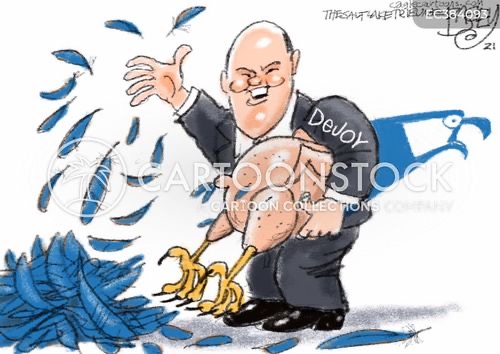By
Howard Bloom
On Monday, March 24, the Postmaster General and Chief Executive Officer of the United States Postal Service, Louis DeJoy, announced that it was his last day in office. In other words, he resigned without notice.

DeJoy had been in office for five years, since Donald Trump appointed him in 2020. And he had been a subject of controversy. Some had hated him and protested against him. But why did he resign?
The post office is a mammoth operation. It employs 630 thousand people, more than the entire population of Atlanta, and delivers 425 million items a day. That’s eight times as many as Amazon, UPS, and Federal Express combined.
The Post Office is committed to equal service for all of us, no matter where we live. Which means it will reach you in even the most remote rural area, in territory that Amazon, UPS, and Federal Express simply don’t service. In fact, to reach these remote areas, Amazon, UPS, and Federal Express hire, guess who? The Post Office.
Yes, Amazon, UPS, and Federal Express turn over your packages to the Postal Service to reach those last miles to your home if you live in a truly remote location.
And the jobs from Amazon, UPS, and Federal Express provide the Post Office’s biggest and most profitable revenue stream.
So, again, why did Louis DeJoy leave? And why did he leave so suddenly? After all, he was in the middle of an ambitious ten year plan to make the Post Office profitable.

And he was succeeding. This last financial quarter was the first of DeJoy’s quarters in which the Post Office made a profit. After losing $100 billion in the last twenty years.
But things were not all rosy for Louis DeJoy. The left was certain he’d been hired to make sure that mail-in voters would not get their ballots and would be locked out of the 2020 election. During the covid crisis, mail-in voters tended to be Democrats. And slowing down mail-in votes would have rigged the 2020 election for Donald Trump.
But a later analysis showed this dark vision wasn’t true. After lawsuits from over twenty states, congressional hearings, and shrieking headlines from the press, DeJoy prioritized ballots and took “extraordinary measures” to speed ballot delivery.
Nonetheless, DeJoy was picketed for removing hundreds of high-speed sorting machines and for cutting overtime, overtime that was costing the post office five billion dollars a year.
In fact, DeJoy had a plan to cut 10,000 postal employees and had just signed an agreement with Elon Musk’s DOGE to slim down the operation and make it more efficient.
But DeJoy may have felt he was in danger of being fired. After all, Donald Trump has shown a habit of firing leaders he appointed in his first term. What’s worse, Donald Trump called the Postal Service under DeJoy “a tremendous loser.”
Word was that Trump wanted to fire the United States Postal Service Board of Governors and was intent on absorbing the Post Office into the Department of Commerce, a move that could possibly have stripped DeJoy of his autonomy or gotten rid of him altogether. He would have answered to Trump’s Secretary of Commerce: Howard Lutnick, who saw this as the first move toward privatizing the Postal Service and getting it off the government’s hands.

After all, the Postal Service is no longer the vital means of communication it was when Ben Franklin founded it in 1775. That role is now filled by your phone, your chat groups, and your email.
The plan to put the Post Office under Lutnick and the prospect of being mangled by Elon Musk’s DOGE may have discouraged DeJoy. But there’s another possible reason DeJoy left. He’s in his late sixties. He has a wife and two kids in their twenties.
He saw heading the postal service as his “retirement job.” Reportedly, five years was his goal for the Post Office General position. He viewed the Post Office Generalship as his final legacy. Or, as DeJoy said in his departure statement, it was “a crowning achievement of my career.”
References:
https://about.usps.com/newsroom/national-releases/2025/0324-usps-pmg-ceo-leadership-transition.htm
https://electionlab.mit.edu/research/voting-mail-and-absentee-voting
https://www.reuters.com/world/us/us-postal-chief-dejoy-stepping-down-immediately-2025-03-24
https://www.axios.com/2025/03/24/dejoy-stepping-down-usps
https://www.axios.com/2025/03/17/usps-doge-trump-cuts-postmaster-general-dejoy
Trumpworld considers Postal Service overhaul
| Trumpworld considers Postal Service overhaul Natalie Daher Trump had a combative relationship with one of America’s favorite agencies during his first term. |
https://www.pbs.org/newshour/show/the-potential-impact-of-a-trump-takeover-of-usps
https://www.cnn.com/2025/03/05/business/musk-usps-amtrak-privatization/index.html
______
Howard Bloom of the Howard Bloom Institute has been called the Einstein, Newton, Darwin, and Freud of the 21st century by Britain’s Channel 4 TV. Bloom’s next book, coming out in spring, 2025, is The Case of the Sexual Cosmos: Everything You Know About Nature is Wrong. Says Harvard’s Ellen Langer of The Case of the Sexual Cosmos, Bloom “argues that we are not savaging the earth as some would have it, but instead are growing the cosmos. A fascinating read.” One of Bloom’s eight previous books–Global Brain—was the subject of a symposium thrown by the Office of the Secretary of Defense including representatives from the State Department, the Energy Department, DARPA, IBM, and MIT. Bloom’s work has been published in scientific journals, and in The Washington Post, The Wall Street Journal, Wired, Psychology Today, and the Scientific American. Says Joseph Chilton Pearce, author of Evolution’s End and The Crack in the Cosmic Egg, “I have finished Howard Bloom’s [first two] books, The Lucifer Principle and Global Brain, in that order, and am seriously awed, near overwhelmed by the magnitude of what he has done. I never expected to see, in any form, from any sector, such an accomplishment. I doubt there is a stronger intellect than Bloom’s on the planet.” For more, see http://howardbloom.net or http://howardbloom.institute
| Home – Howard Bloom Institute |

